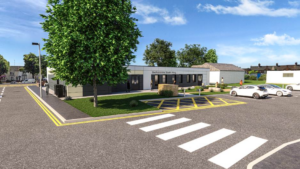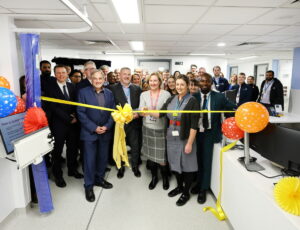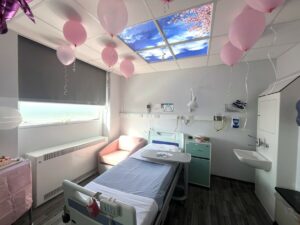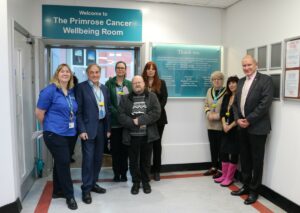GP Newsletter
Welcome from Paul Tisi, Medical Director
 Welcome to the Winter 2024/2025 edition of GP Matters.
Welcome to the Winter 2024/2025 edition of GP Matters.
It has been an extremely challenging start to the year, with a significant increase in demand on our services. We have seen high numbers of very ill patients coming through our doors, and a continued prevalence of winter viruses in the community and on our wards.
Please continue to encourage your patients to only attend our Emergency Departments (EDs) if they require urgent and emergency care. Anybody attending our EDs with minor illnesses will experience long waits as we prioritise patients in order of clinical need.
Patients with appointments should continue to attend, unless told otherwise.
This edition features information on the official opening of the Emergency Department at the Luton and Dunstable University Hospital and plans for a new Same Day Emergency Care Unit at Bedford Hospital.
Best wishes and happy reading!
Paul Tisi,
Medical Director
New Same Day Emergency Care Unit to be built at Bedford Hospital
 Patients, staff and the local community are set to benefit from a new Same Day Emergency Care (SDEC) Unit on the Bedford Hospital South Wing site, with construction work starting in the coming weeks.
Patients, staff and the local community are set to benefit from a new Same Day Emergency Care (SDEC) Unit on the Bedford Hospital South Wing site, with construction work starting in the coming weeks.
The SDEC Unit will allow healthcare specialists, where appropriate, to assess, diagnose and treat patients on the same day of arrival, who would otherwise have been admitted to the hospital.
The NHS continues to pursue more efficient models of care that drive improvements for our community, ultimately providing the right care, in the right place, delivered by the right healthcare professional. The proposed SDEC Unit will enable this to happen and avoid unnecessary hospital admissions.
The building, which will be located opposite the Emergency Department (ED), is expected to open to patients in the Autumn of 2025.
David Carter, Chief Executive of Bedfordshire Hospitals, said: “As the population grows, and population growth in Bedfordshire is significantly higher than the national average, the demand on NHS urgent and emergency services increases.
“The development of the new SDEC will allow us to assess, diagnose and treat a high volume of patients each day, in a timely manner, alleviating the pressure on our Emergency Department.”
Dr Tom Larsen, Clinical Director of the Emergency Department at Bedford Hospital, said: “With the creation of the new SDEC, not only will we be able to treat patients in the most appropriate way on the same day, but the patient experience will improve without the need to be admitted into the hospital.”
The new SDEC facility will be delivered by offsite construction specialist, Merit, using advanced Modern Methods of Construction (MMC), with more than 80% of this technically complex build taking place off-site at Merit’s factory in Northumberland. This approach will shorten the construction time on the busy hospital grounds, minimising disruption and enhancing project efficiencies, resulting in a faster, more efficient, and more sustainable building process.
ReSPECT form to be rolled out
At the end of March 2025, the Trust will be rolling out a new form called ReSPECT at both Bedford Hospital and the Luton and Dunstable University Hospital (L&D) to replace the current ‘Do Not Attempt Resuscitation’ (DNACPR) form for patients being discharged.
ReSPECT (Recommended Summary Plan for Emergency Care and Treatment) forms are designed to provide clear and personalised guidance about a patient’s preferences regarding emergency treatment and care.
While the current DNACPR forms focus specifically on whether or not a patient should receive CPR in the event of cardiac or respiratory failure, they do not address other aspects of emergency care or medical treatment.
The ReSPECT form provides a more detailed plan, allowing for tailored recommendations for individuals’ clinical care in future emergencies. It reflects a move towards more comprehensive and person-centred care, respecting both patient preferences and clinical judgement.
It aims to do this through empowering patients to express their care preferences, guiding healthcare professionals in emergencies, encouraging open communication, ensuring continuity of care, and supporting ethical decision-making by prioritising patient autonomy while aligning with best clinical practices.
Hospital staff are being trained in the use of the ReSPECT form, and will be able to answer your questions about what the change will mean practically. More information about ReSPECT, along with answers to frequently asked questions, can be found on the Resuscitation Council UK website.
Phlebotomy services at Gilbert Hitchcock House, Bedford Hospital (North Wing)
You may well be aware of the challenges we have been facing with increased waiting times for blood test appointments at Gilbert Hitchcock House (North Wing, Bedford Hospital) and wanted to provide an update on the steps we are taking to address them.
Current situation
Over recent months, demand for blood test appointments at Gilbert Hitchcock House (GHH) has risen significantly. This has been driven by multiple factors, including increased GP referrals, staff absences and logistical pressures.
Actions taken to mitigate delays according to complaint
Patients who need urgent blood test being turned away at GHH
We are aware there have been some cases where patients have been referred with an urgent blood test form for a routine medication review. We have worked closely with various GP surgeries to improve this and manage patient’s expectations. We can now provide assurance that patients are not turned away when they walk in or try and book an urgent blood test.
We have placed signage in GHH to advise all patients with urgent blood test request forms that they will be offered a same day appointment.
Patients unable to book a blood test in a timely manner
This is a concern for the Trust and an area we have been working hard to address as we completely understand how frustrating this is for our patients and GPs. Previously, the booking system only opened up appointment slots in a two week block, which would get booked up quickly and mean some patients struggled to book a blood test in a timely manner. We have recently changed this and extended the appointment booking slots from two to four week blocks. Patients can now see availability of appointments slots for the next four weeks.
There are a selection of protected slots that the team open up daily. This is done to accommodate any requests for urgent blood tests and are usually opened up from 10am for a same day appointment (in the afternoon) where possible.
Patient’s phone calls to the department not being answered
Whilst we endeavour to answer all calls at the reception desk, this is often very difficult with the large number of patients needing to be booked in or queuing for queries at the reception desk. We understand how frustrating this can be for patients trying to book their blood test and facing difficulties finding availability on the online / automated booking system. To address this issue, as well as improving the patient waiting time whilst in the department, we have commenced a recruitment campaign to appoint to the below job roles:
- Telephonist – Monday to Friday – 10am to 3pm
- Phlebotomist – Monday to Friday – full-time
Temporary staff from the Trust’s ‘Bank’ system (our non-permanent staff) to assist within the department as and when needed.
Recruiting to these posts will allow us to have a dedicated manned phone line for appointments and queries, which will free up our receptionist to tend to the patients who present at the desk. An additional Phlebotomist will help us to reduce the long waiting times patients experience when they arrive for their appointment and assist in meeting the increased demand for blood testing services.
For transparency and to manage expectations, we have revised patient information on our website to alert people of the high demand we’re experiencing.
Patients experiencing long waiting times during their appointment
As mentioned above, we anticipate the recruitment campaign will have a positive impact in helping us to meet the increased demand. In addition to this, as part of the redevelopment project at GHH where a new Primary Care Hub is being built, one of the first services to move into the new redeveloped building will be our phlebotomy services. This move is anticipated to be completed in April 2025, with the remainder of the project on track for completion in autumn 2025. The new phlebotomy department will be larger to comfortably accommodate the increased capacity, with staff and patients benefiting from providing and receiving treatment in a modern environment, more fit for purpose.
Change of service telephone number
The telephone number for the Luton Community Paediatric Physiotherapy Team at Redgrave Children and Young People’s Centre will be changing from the 1 March to 01582 329698.
Blood Borne Virus (BBV) opt-out testing
From 3 March 2025, our Emergency Departments (ED) will be taking part in the national Blood Borne Virus (BBV) Opt-out Testing programme that aims to identify those living with an undiagnosed BBV, offer treatment and save lives.
Any patient aged 16 or over who attends our ED and has their bloods taken for any reason will automatically be tested for Blood Borne Viruses i.e. hepatitis B, hepatitis C and HIV. If the test comes back positive, the patient will be offered specialist support and treatment from hepatology and sexual health services. Patients can opt-out of the testing by speaking to a member of staff in the department.
This automatic testing is part of a national NHS initiative to test in areas with the highest prevalence of these diseases. Following the original pilots in London, Brighton and Blackpool, it is now being expanded as part of a national effort to eliminate the transmission of these viruses by 2030.
Feedback from pilot sites is that this has had a significant impact on identifying infections in people who might not seek testing otherwise, enabling them to access treatment earlier. Over seven million tests have been carried out since the programme was introduced in April 2022, identifying over 7,300 new cases of BBV infection.
Increasing the early detection and diagnoses of blood borne viruses means our patients can access the latest and most effective life-saving medication, which can prevent long-term health issues and reduce the chance of unknown transmissions to others.
Refurbished Emergency Department at the L&D officially opened
 The newly refurbished and expanded Emergency Department (ED) at the Luton and Dunstable University Hospital (L&D) is now fully operational to patients.
The newly refurbished and expanded Emergency Department (ED) at the Luton and Dunstable University Hospital (L&D) is now fully operational to patients.
The project, which began in 2021, has been delivered within a live clinical environment throughout a number of phases, with the final phase now complete.
The official opening was attended by the Trust’s executive team, clinical staff, redevelopment and estates teams, key partners and special guests Gary Sweet, Chief Executive, and Mick Harford, Chief Recruitment Officer, at Luton Town Football Club.
In June 2022, six modern majors cubicles were created to support with the isolation of patients attending with potential infections, monitoring of higher acuity patients, as well as providing a quieter treatment area for the most vulnerable patients.
In July 2023, a new entrance and waiting area, a dedicated paediatric area and nine new major cubicles opened.
The final phase of works has seen the expansion of the department where there is now a further increase in capacity, including assessment and triage rooms, and sensitively designed mental health care rooms.
The bright, modern and spacious areas will make a huge difference to patient dignity and experience when attending ED, and will also allow staff to provide outstanding care in the very best environment.
The ED often has over 300 attendees each day, and the expansion of the department supports the Trust with the increasing demand for emergency care.
David Carter, Chief Executive at Bedfordshire Hospitals, said: “We are delighted that our new and improved ED is now open, which has been a well needed investment for our local community. We know it will make a huge difference to the staff providing care and those patients receiving it.
“The difficulty of rebuilding an ED whilst keeping it running 24/7 cannot be underestimated, so I would like to thank all involved for delivering this project.”
Dr Ahmad Mchaourab, Consultant for Emergency Medicine and ED Redevelopment Lead at the L&D, said: “With the final work now complete, we look forward to continuing to provide the very best care for our patients in a modern and purpose-built environment.”
Stewart Brundell, Managing Director at Willmott Dixon, added: “We are incredibly proud to be handing over this facility, which will serve the local community for generations to come. It’s been fantastic to hear the difference it will make to the amazing staff who will benefit daily from what we’ve provided. It really is a testament to the hard work, collaboration, and a shared commitment to excellence by all those involved in delivering this project.”
Blossom Room opens for patients in their final days
 A Blossom Room has been created for patients to spend their final days with their loved ones on Shand Ward at Bedford Hospital.
A Blossom Room has been created for patients to spend their final days with their loved ones on Shand Ward at Bedford Hospital.
The calming, comfortable and private room features a blossom themed sky panel, television, pink furnishings and a reclining bed chair for relatives to stay close by.
The idea of the Blossom Room was spearheaded by Jane Arnold, in memory of her father Barry Gilbert, who was extremely grateful to be able to spend time with him during his last days in May 2020.
Jane Arnold said: “The room looks absolutely fantastic, and I know that it will bring great comfort to both the patient and those who find themselves having to say goodbye to their loved ones. I hope this room shows people how important end of life/palliative care is, not just for those who are dying, but for those who are left.”
Bedfordshire Hospitals NHS Charity has delivered this project thanks to Jane and other supporters, including Bedford Hospital Charity and Friends.
The Blossom Room will also be welcomed by Blossom Volunteers who provide support and companionship to those receiving end of life care and their loved ones. They help to ensure that, wherever possible, no-one dies alone.
Annie Tucker, Blossom Service Co-ordinator at Bedfordshire Hospitals NHS Charity, said: “We are always looking for ways to enhance patient care and relatives experience for our end of life patients and the Blossom Room does exactly that. A huge thank you to our donors for making this happen. We really hope we can create more rooms like this for our patients in the future.”
Liz Lees, Chief Nurse at Bedfordshire Hospitals, added: “Saying goodbye to a loved one is one of the most difficult things to do, but having the Blossom Room available will really make such a difference to our patients and their relatives. We are so grateful for all the support in making this possible.”
Primrose Cancer Wellbeing Room and Garden at Bedford Hospital opened
 A new Wellbeing Room and Garden has been created for the Primrose Unit at Bedford Hospital, which will provide vital support and information for our cancer patients.
A new Wellbeing Room and Garden has been created for the Primrose Unit at Bedford Hospital, which will provide vital support and information for our cancer patients.
This new area includes an information corner, a refreshment bar and a calm wellbeing room, which includes a massage chair and a refurbished garden. These essential additions will help to enable a more consistent service to patients, improving their quality of care and access to information. The psychology service, dietitians, clinical nurse specialists and navigators will all be able use this space to see patients and run bookable informative sessions that will be available to all cancer patients in Bedford Hospital’s care, regardless of treatment.
As an extension of the existing Primrose Unit, it is designed to continue the support of outpatients in the Bedford area through their cancer journey. From initial diagnosis, to treatment, wellbeing financial support, emotional support, prosthetics, and much more.
The Primrose Unit supports thousands of patients every year and has a dedicated team who are regularly trained on the latest treatments and support processes to ensure patients receive the highest quality of care.
Karen Jackson, General Manager for Cancer Services at Bedford Hospital, said: “These areas will provide much needed respite for patients undergoing various stages of treatment. Allowing them easier access to information and support will help each patient navigate their personal health journey. The Wellbeing Centre is designed to be a calming space and I think this has been perfectly achieved. We can’t wait for patients to start using the space.”
Bedfordshire Hospitals NHS Charity has been able to fund this project with thanks to generous individual and community donations, including patients who are part of the current support group or those who have left gifts in their will.
Charmaine Norrish, Fundraising Manager at Bedfordshire Hospitals NHS Charity, added: “A huge thank you to our donors for helping us create this new room and garden. It is always so rewarding when we are able to enhance patient care and wellbeing. Designing areas such as these do exactly this.”
The opening celebrations were attended by donors, those who worked on the project, Bedfordshire Hospitals NHS Foundation Trust Senior Team, Governors and Ambassadors. Governor Yvette King had the honour of cutting the opening ribbon with the help of Chair Richard Sumray and Deputy Lieutenant Nicholas Kier.
